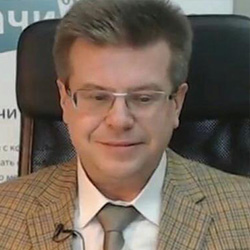
Vitalii Kovalchuk
Hospital N38 named after N.A. Semashko (St.-Petersburg, Russia); Cambridge University (England), Russian Federation; UKPresentation Title:
Factors impeding rehabilitation & restoration of patients after brain lesion
Abstract
A lot of factors which are impeding restoration in brain lesion’s patients. First one is a syndrome of consequence of therapy in intensive care unit. There are two reasons of this syndrome: immobilization & cognitive & social isolation. How to avoid these reasons? First of all, early verticalization. But we must consider the certain demands to condition of a patient, we have absolute contraindications to verticalization. Knowledge of risk factors of poor reaction on verticalization is very important. More often we use the coefficient of overshoot as the main indicator. It is calculated according this Doppler’s formulation. And at last, there are some so called stop signals which testify that we must stop verticalization immediately. Non-observance of rules of posture correction is one of the main factors impeding rehabilitation & restoration of patients after brain lesion. We’ll consider the main rules of posture correction. It is necessary to find out the dominating patient's pose in a sitting position before the beginning of rehabilitation because the type of this pose will influence the choice of rehabilitation methods. There are two such pathological poses. Pull-syndrome – a patient "moves" himself on a healthy part of a body. Push-syndrome – deviation at the defeated side, and the difficulties with patient’s verticalisation. Push-syndrome often forms in the presence of a neglect-syndrome, which is one of the main factor impeding carrying out the adequate rehabilitation. A neglect-syndrome is a residual ability to react on influences or to perceive the information from the side opposite to the damaged hemisphere. There are some tests that help us to verify a neglect-syndrome, such as Albert's test, drawing and so on. Optical defect, as a rule, isn't realized by the patient, and vision defect often doesn't revealed at research of fields sight. Why? Because this syndrome is more cognitive syndrome. In the expressed cases patients shave only one half of the face, don't put the second hand in the jacket or shirt or put both legs into one trouser leg, they are ignoring the second one. Rules of maintaining the patient with a neglect are actually rather simple, and don't demand the expressed financial expenses and physical efforts. The next factors which are impeding restoration in brain lesion’s patients are muscular spasticity & pain. The ways of prophylaxis & methods of treatment will were discussed. Cognitive impairments & psychoemotional disorders are breaking carrying out the adequate rehabilitation. We’ll note the features of cognitive & psychoemotional rehabilitation.
Biography
His research and practical areas including the rehabilitation of patients with damage of brain (stroke, drain injury and so on), chronic brain ischemia, pain syndromes, cognitive and psychoemotional impairments, and has published widely in these fields and has lectures and master-classes at different region and countries all over the World. Career: resident of Pavlov's St.-Petersburg Medical University (Neurological Department, 1993-1995); researcher (Neurological Department, 1995-1997); associated professor of Medical Faculty of St.-Petersburg University (2008-2011); Honorary Doctorate of Letters (since 2013), Vice-President of World Congress of Arts, Sciences and Communications (since 2015). Career Related: Fellow of Stroke Association of UK (since 1998); Chairman of St.-Petersburg's Society of Rehabilitation (since 2008); Adjunct Professor of Neurological Association of Russian's NorthWest Region (since 2009); Adjunct Professor of European Academy of Natural Sciences (since 2012); Fellow of Presidium of St.-Petersburg's Neurological Association (since 2016). Awards: Best Researcher of Year, 2011 (Academy of Medical Science, Russia); Best Doctor of Russian Federation (Ministry of Health 2011); Lifetime Achievement Award of World Congress of Arts, Sciences and Communications (2012); Great Minds of the 21st Century Award (ABI – 2012); Hall of Fame Award (IBC – 2012); World Lifetime Achievement Award (ABI – 2012); American Hall of Fame Award (ABC – 2012); Honoured Scientist of Europe (European Academy of Natural Sciences – 2012); Albert Schweitzer Medal Award for Humanism and Service to the People (European Academy of Natural Sciences – 2012); Max Joseph Pettenkofer's Medal Award for outstanding achievements and merits in the field of medical researches (European Academy of Natural Sciences – 2014); Honoured Doctor of Russia (2015).

